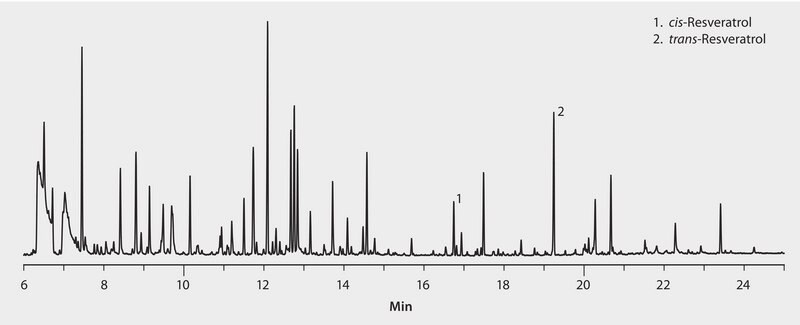GC Analysis of Resveratrol in Red Wine (Spiked) on SLB®-5ms after SPME using a 85 μm Polyacrylate Fiber

Materiales
analytical column
For use with
Screw Top Vial with Hole Cap, Pre-assembled
volume 4 mL, clear glass vial, O.D. × H 15 mm × 45 mm, tan PTFE/silicone septumSPME fiber
related product
standard
CONDITIONS
sample/matrix
3 mL of red wine (California merlot) spiked with resveratrol at 100 μg/L then diluted 3:1 in 12% ethanol:water
SPME fiber
85 μm polyacrylate (57304, 57305, 57294-U)
extraction
immersion for 15 min at room temperature while stirring at 400 rpm, fiber gently blotted with a Kimwipe to remove excess water, (then derivatization by immersion in a 4 mL vial containing 5 μL of Sylon-BFT (fresh vial for each analysis than was allowed to equilabrate 60-90 minutes prior to use) for 20 min)
desorption process
280 °C for 2 min
column
SLB-5ms; 30 m x 0.25 mm I.D., 0.25 μm (28471-U)
oven
100 °C (1 min), 10 °C/min to 325 °C (3 min)
inj. temp.
280 °C
detector
GC/MS
MSD interface
325 °C
scan range
m/z 40-450
carrier gas
helium, 1 mL/min, constant
liner
0.75 mm I.D., SPME
sample
Red wine
Descripción
Analysis Note
In this study, the extraction and analysis of resveratrol from red wine is demonstrated using solid phase microextraction (SPME) and GC/MS. The presence of three hydroxyl (OH) groups makes it necessary to derivatize this compound prior to GC analysis. Derivatization was conducted, after extraction, directly on the SPME fiber by exposing it to the vapors of a silyating reagent. The derivative of resveratrol was then analyzed directly from the fiber using GC/MS. The polyacrylate fiber, which is suitable for the extraction of polar semivolatiles and is more resistant to swelling than other types of fibers was used in the analysis. The SLB-5ms GC columns provide consistently low-bleed, inert, efficient, and durable separations.
Legal Information
SLB is a registered trademark of Merck KGaA, Darmstadt, Germany